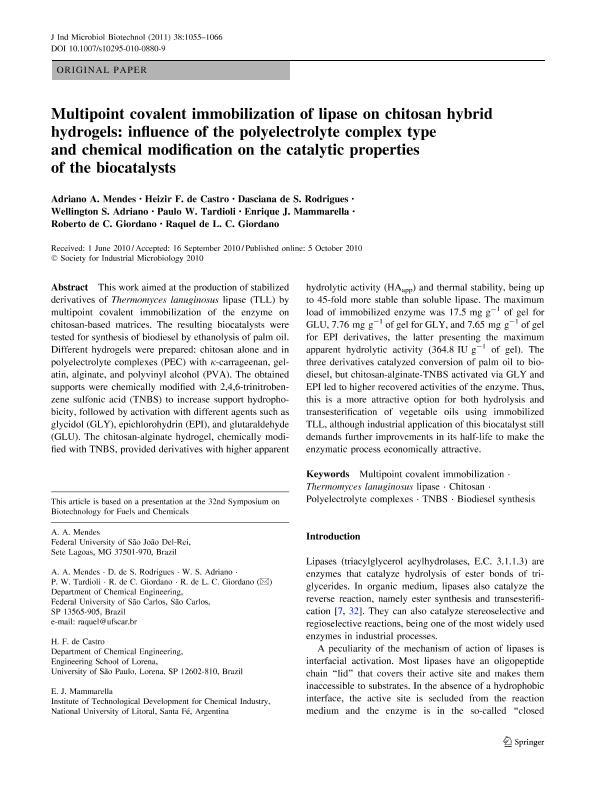Mostrar el registro sencillo del ítem
dc.contributor.author
Mendes, Adriano
dc.contributor.author
Castro, Heizir
dc.contributor.author
Rodrigues, Dasciana
dc.contributor.author
Adriano, Wellington
dc.contributor.author
Tardioli, Paulo
dc.contributor.author
Mammarella, Enrique José

dc.contributor.author
Giordano, Roberto
dc.contributor.author
Giordano, Raquel
dc.date.available
2017-02-16T15:39:28Z
dc.date.issued
2011-10
dc.identifier.citation
Mendes, Adriano; Castro, Heizir; Rodrigues, Dasciana; Adriano, Wellington; Tardioli, Paulo; et al.; Multipoint covalent immobilization of lipase on chitosan hybrid hydrogels: influence of the polyelectrolyte complex type and chemical modification on the catalytic properties of the biocatalysts; Springer Heidelberg; Journal Of Industrial Microbiology; 38; 8; 10-2011; 1055-1066
dc.identifier.issn
1367-5435
dc.identifier.uri
http://hdl.handle.net/11336/13098
dc.description.abstract
This work aimed at the production of stabilized derivatives of Thermomyces lanuginosus lipase (TLL) by multipoint covalent immobilization of the enzyme on chitosan-based matrices. The resulting biocatalysts were tested for synthesis of biodiesel by ethanolysis of palm oil. Different hydrogels were prepared: chitosan alone and in polyelectrolyte complexes (PEC) with kappa-carrageenan, gelatin, alginate, and polyvinyl alcohol (PVA). The obtained supports were chemically modified with 2,4,6-trinitrobenzene sulfonic acid (TNBS) to increase support hydrophobicity, followed by activation with different agents such as glycidol (GLY), epichlorohydrin (EPI), and glutaraldehyde (GLU). The chitosan-alginate hydrogel, chemically modified with TNBS, provided derivatives with higher apparent hydrolytic activity (HA(app)) and thermal stability, being up to 45-fold more stable than soluble lipase. The maximum load of immobilized enzyme was 17.5 mg g(-1) of gel for GLU, 7.76 mg g(-1) of gel for GLY, and 7.65 mg g(-1) of gel for EPI derivatives, the latter presenting the maximum apparent hydrolytic activity (364.8 IU g(-1) of gel). The three derivatives catalyzed conversion of palm oil to biodiesel, but chitosan-alginate-TNBS activated via GLY and EPI led to higher recovered activities of the enzyme. Thus, this is a more attractive option for both hydrolysis and transesterification of vegetable oils using immobilized TLL, although industrial application of this biocatalyst still demands further improvements in its half-life to make the enzymatic process economically attractive.
dc.format
application/pdf
dc.language.iso
eng
dc.publisher
Springer Heidelberg

dc.rights
info:eu-repo/semantics/openAccess
dc.rights.uri
https://creativecommons.org/licenses/by-nc-sa/2.5/ar/
dc.subject
Multipoint Covalent Immobilization
dc.subject
Thermomyces Lanuginosus Lipase
dc.subject
Chitosan
dc.subject
Polyelectrolyte Complexes
dc.subject.classification
Bioprocesamiento Tecnológico, Biocatálisis, Fermentación

dc.subject.classification
Biotecnología Industrial

dc.subject.classification
INGENIERÍAS Y TECNOLOGÍAS

dc.title
Multipoint covalent immobilization of lipase on chitosan hybrid hydrogels: influence of the polyelectrolyte complex type and chemical modification on the catalytic properties of the biocatalysts
dc.type
info:eu-repo/semantics/article
dc.type
info:ar-repo/semantics/artículo
dc.type
info:eu-repo/semantics/publishedVersion
dc.date.updated
2017-02-09T13:51:29Z
dc.journal.volume
38
dc.journal.number
8
dc.journal.pagination
1055-1066
dc.journal.pais
Alemania

dc.journal.ciudad
Heidelberg
dc.description.fil
Fil: Mendes, Adriano. Universidade Federal do Sao Carlos; Brasil
dc.description.fil
Fil: Castro, Heizir. Universidade Federal do Sao Carlos; Brasil
dc.description.fil
Fil: Rodrigues, Dasciana. Universidade Federal do Sao Carlos; Brasil
dc.description.fil
Fil: Adriano, Wellington. Universidade Federal do Sao Carlos; Brasil
dc.description.fil
Fil: Tardioli, Paulo. Universidade Federal do Sao Carlos; Brasil
dc.description.fil
Fil: Mammarella, Enrique José. Consejo Nacional de Investigaciones Científicas y Técnicas. Centro Científico Tecnológico Santa Fe. Instituto de Desarrollo Tecnológico para la Industria Química (i); Argentina
dc.description.fil
Fil: Giordano, Roberto. Universidade Federal do Sao Carlos; Brasil
dc.description.fil
Fil: Giordano, Raquel. Universidade Federal do Sao Carlos; Brasil
dc.journal.title
Journal Of Industrial Microbiology

dc.relation.alternativeid
info:eu-repo/semantics/altIdentifier/doi/http://dx.doi.org/10.1007/s10295-010-0880-9
dc.relation.alternativeid
info:eu-repo/semantics/altIdentifier/url/http://link.springer.com/article/10.1007%2Fs10295-010-0880-9
Archivos asociados
